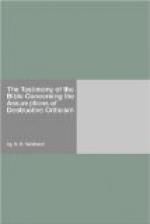16: Isaiah xlvii:4—“As for our Redeemer, the Lord of hosts is his name, the Holy One of Israel.”
17: Isaiah xlviii:17—“Thus saith the Lord, thy Redeemer, the Holy One of Israel, I am the Lord thy God, which teacheth thee to profit, which leadeth thee by the way that thou shouldest go.”
18: Isaiah xlix:7—“Thus saith the Lord ... Kings shall see and arise, princes also shall worship, because of the Lord that is faithful, and the Holy One of Israel, and he shall choose thee.”
19: Isaiah liv:5—“For thy Maker is thine husband; The Lord of hosts is his name, and thy Redeemer is the Holy One of Israel; The God of the whole earth shall he be called.”
20: Isaiah lv:5—“Nations that knew not thee, shall run unto thee because of the Lord thy God, and for the Holy One of Israel.”
21: Isaiah lx:9—“The Isles shall wait for me, and the ships of Tarshish first, to bring thy sons from far, their silver and their gold with them, unto the name of the Lord thy God, and to the Holy One of Israel, because he hath glorified thee.”
22: Isaiah lx:14—“And they shall call thee the city of the Lord, the Zion of the Holy One of Israel.”
The reader will notice that this phrase, as applied to God is a characteristic of Isaiah. We have not found it in any of the minor prophets, and but twice in the prophecies of Jeremiah, and once in Ezekiel. But Isaiah uses it more than twenty times, running from the first to the sixtieth chapter. He uses it ten times before reaching the fortieth chapter, and twelve times in the chapters following, which the critics have assigned to some unknown author or authors. Shall we be asked to conclude that the unknown authors adopted Isaiah’s style, his phraseology, from the fortieth chapter to the end of the book? For what motive? To conceal themselves? The assumption is too large. If the first thirty-nine chapters of this book are accepted, as the prophecies of Isaiah, by every law of fair criticism the whole book must claim this prophet as its author.
VII. GOD’S REPLY TO THESE ASSUMPTIONS.
"Nay but, O man, who art thou that repliest against God?” Rom. ix. 20.
"At the mouth of two witnesses, or at the mouth of three witnesses, shall the matter be established.” Deut. xix. 15.
"Whatsoever things were written aforetime were written for our learning, that we through patience and comfort of the Scriptures might have hope.” Rom. xv. 4.
"Now all these things happened unto them for ensamples; and they are written for our admonition, upon whom the ends of the world are come.” 1 Cor. x. 11.
"My people shall know my name, therefore they shall know in that day that I am he that doth speak, Behold, it is I.” Isaiah lii. 6.
In the New Testament we have in the Gospels and the Epistles God’s teachings concerning the Old Testament. The writers of the New Testament had the promise of our Lord that “The Comforter, who is the Holy Spirit, whom the Father will send in my name, He shall teach you all things, and bring all things to your remembrance, whatsoever I have said unto you.” (John xiv. 26.)




